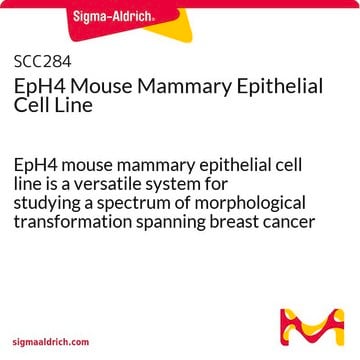Target description
PyMT-1099 is a stable murine breast cancer cell line derived from a mammary tumor (mammary gland 2/3) of MMTV-PyMT (mouse mammary tumor virus-polyomavirus middle tumor-antigen) transgenic female mouse of FVB/N background (Saxena 2018). PyMT is an oncogene which transforms cells in culture and leads to formation of mammary tumor in MMTV-PyMT mouse by interacting with non-receptor tyrosine kinase, c-Src (1).These cells have a well differentiated, cobblestone-like morphology similar to epithelial cells and have PyMT transgene in their genome. Orthotopic implantation of these cells in immunocompromised NOD/SCID, common gamma receptor −/− (NSG) mice resulted in formation of palpable tumor after 14 weeks. Also, 50% of the mice had macroscopic metastatic tumors in their lungs exhibiting invasive characteristics (2).Breast cancer is currently the most common cancer globally. In the United States, around 287,850 new cases of invasive breast cancer and 43,250 breast cancer associated deaths were estimated in 2022 (3). Epithelial-mesenchymal transition (EMT) is a process involved in the initiation of the invasion-metastasis cascade of cancer cells. PyMT-1099 undergo epithelial-mesenchymal transition (EMT) in response to TGFβ addition in vitro and undergo a complete mesenchymal to epithelial transition (MET) upon TGFβ withdrawal. TGFβ treatment (2 ng/mL) of PyMT-1099 cells resulted in complete reduction of epithelial markers such as E-cadherin and Zona Occludens (ZO-1), while the mesenchymal markers Fibronectin (FN1) was significantly, and N-Cadherin was moderately upregulated as evidenced by immunofluorescence (2). Although stimulation with TGFβ was reported to induce the canonical pathway as evidenced by nuclear translocation of the Smad2/3 complex and phosphorylation of Smad3 (4), these cells are resistant to the TGFβ induced cell cycle arrest and utilizes non-canonical TGFβ signaling to induce EMT. Long term treatment with TGFβ (2 ng/mL) for 20 days results in formation of mesenchymal subline of cells (PyMT LT) with elongated morphology. PyMT LT cells exhibit higher migratory potential compared to untreated PyMT-1099 cells or NMuMG (immortalized normal murine mammary gland) cells in a modified Boyden chamber transwell migration assay. Also, in contrast to their epithelial counterpart, PyMT-1099 cells, 100% of mice (immunocompromised-NOD) implanted orthotopically with PyMT-1099 LT cells had macroscopic lung metastatic lesions (2). SourcePyMT-1099 cells were derived from mammary tumors of MMTV-PyMT transgenic female FVB/N mice (1).References1. Shanzer M, Ricardo-Lax I, Keshet R, Reuven N, Shaul Y. 2015. The polyomavirus middle T-antigen oncogene activates the Hippo pathway tumor suppressor Lats in a Src-dependent manner. Oncogene. 34(32): 4190-4198.2. Saxena M, Kalathur RKR, Neutzner M, Christofori G. 2018. PyMT-1099, a versatile murine cell model for EMT in breast cancer. Sci Rep. 8(1): 12123. 3. Giaquinto AN, Sung H, Miller KD, Kramer JL, Newman LA, Minihan A, Jemal A, Siegel RL. 2022. Breast Cancer Statistics, 2022. CA Cancer J Clin. 72(6): 524-541. 4. Waldmeier L, Meyer-Schaller N, Diepenbruck M, Christofori G. 2012. Py2T murine breast cancer cells, a versatile model of TGFβ-induced EMT in vitro and in vivo. PLoS One. 7(11): e48651.
Disclaimer
Unless otherwise stated in our catalog or other company documentation accompanying the product(s), our products are intended for research use only and are not to be used for any other purpose, which includes but is not limited to, unauthorized commercial uses, in vitro diagnostic uses, ex vivo or in vivo therapeutic uses or any type of consumption or application to humans or animals.









